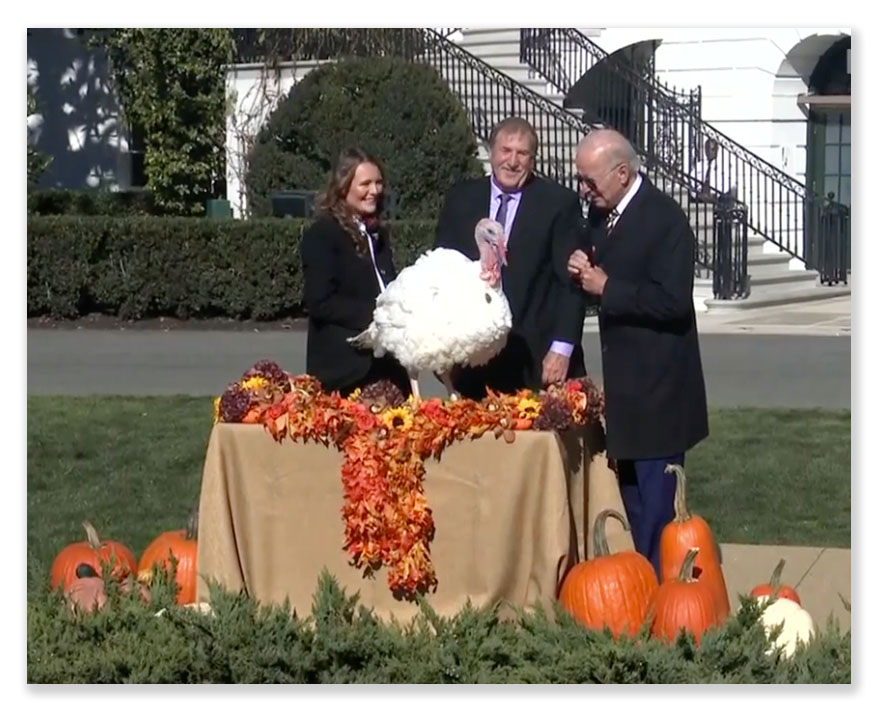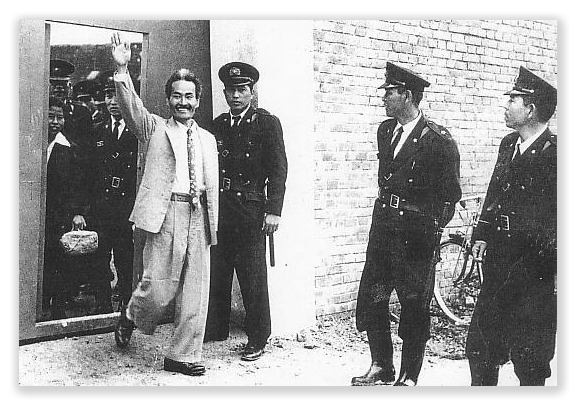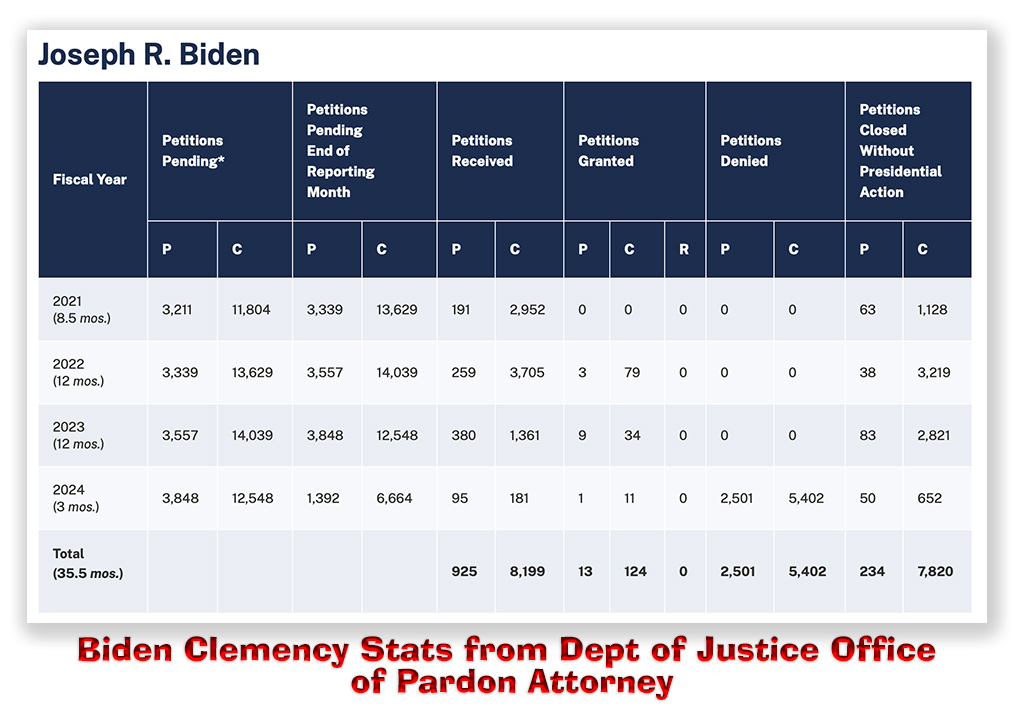We post news and comment on federal criminal justice issues, focused primarily on trial and post-conviction matters, legislative initiatives, and sentencing issues.

TURKEY TIME FOR JOE BIDEN
Today, Minnesota turkey farmer John Zimmerman and his son Grant visited the White House to see two of their prize turkeys, Peach and Blossom, receive presidential clemency, something that thousands of human federal prisoners would happily take the birds’ place in order to receive.
 President Joe Biden pardoned the 7th and 8th turkeys to receive clemency in his Administration. The spectacle is an annual Thanksgiving ritual that this year is being staged amid a clamor for Biden to issue a veritable feast of real pardons and commutations in the waning days of his Administration.
President Joe Biden pardoned the 7th and 8th turkeys to receive clemency in his Administration. The spectacle is an annual Thanksgiving ritual that this year is being staged amid a clamor for Biden to issue a veritable feast of real pardons and commutations in the waning days of his Administration.
In the nearly four years he has been in office, Biden has granted 25 pardons and 132 commutations out of the thousands of applications filed. He has also pardoned two classes of people who were not incarcerated, people convicted of simple marijuana possession and members of the military who were court-martialed because of their sexual orientation.
Nearly all of the commutations have involved drug offenses. They number 38 more commutations than his predecessor, Donald Trump, granted in his first term, but fewer than one-tenth of the sentences Barack Obama commuted in his second term. About 8,002 petitions for clemency are pending (including for the two turkeys).
 Last Wednesday, a gobbling flock of advocates, former prisoners, and families joined 67 congressional leaders in a joint letter urging President Biden to grant clemency to non-violent federal cannabis prisoners before his term ends.
Last Wednesday, a gobbling flock of advocates, former prisoners, and families joined 67 congressional leaders in a joint letter urging President Biden to grant clemency to non-violent federal cannabis prisoners before his term ends.
Among federal prisoners, “90% of people are convicted of non-violent offenses. Now is the time to use your clemency authority to rectify unjust and unnecessary criminal laws passed by Congress and draconian sentences given by judges,” the letter says. “We urge you to use your executive clemency power to reunite families, address longstanding injustices in our legal system, and set our nation on the path toward ending mass incarceration.”
Reps Ayanna Pressley (D-MA), James Clyburn (D-SC), and Mary Gay Scanlon (D-PA) were lead signers of the letter.
 Also, in a briefing last week, Prison Policy Initiative stated, “Although he’s extended pardons and commutations during his term, President Joe Biden has yet to use his clemency powers for a person facing the federal death penalty, despite openly opposing capital punishment at one time. Biden can still heed increasing calls from advocates to improve his minimal clemency record and clear federal death row of all 40 current death sentences… Given that president-elect Donald Trump enthusiastically supports the death penalty — and has historically abused the pardon power — President Biden could spare 40 lives immediately and reclaim the true function of clemency by commuting all federal death sentences.”
Also, in a briefing last week, Prison Policy Initiative stated, “Although he’s extended pardons and commutations during his term, President Joe Biden has yet to use his clemency powers for a person facing the federal death penalty, despite openly opposing capital punishment at one time. Biden can still heed increasing calls from advocates to improve his minimal clemency record and clear federal death row of all 40 current death sentences… Given that president-elect Donald Trump enthusiastically supports the death penalty — and has historically abused the pardon power — President Biden could spare 40 lives immediately and reclaim the true function of clemency by commuting all federal death sentences.”
Not that President-elect Trump is anti-pardon. He loves them… for the right people.
Last week, a Trump-appointed federal judge said it would be “beyond frustrating and disappointing” if Trump grants sweeping clemency to most of the defendants charged in the January 6, 2021, attack on the Capitol. Federal Judge Carl Nichols (District of Columbia) blasted the prospect of “blanket pardons” or “anything close” during the sentencing of a defendant facing eight assault charges.
Politico said, “Nichols’ comments were a surprise from the typically restrained judge and came at the end of a hearing in which he and federal prosecutors grappled at length with the potential impact of Donald Trump’s election on ongoing Jan 6 cases. He added that “anything close to blanket clemency would be similarly frustrating.”
This American Life: America’s Next Top Gobble (November 15, 2024)
Guardian, Biden must Trump-proof US democracy, activists say: ‘There is a sense of urgency’ (November 24, 2024)
Letter to President Biden (November 20, 2024)
The Appeal, U.S. Reps Urge Biden to Use Clemency to Correct “Extreme Use of Incarceration” (November 20, 2024)
Prison Policy Initiative, Talking turkey about the death penalty: outgoing governors and the president must use their clemency power now (November 18, 2024)
Politico, Trump-appointed judge opposes ‘blanket pardons’ for Jan. 6 defendants (November 19, 2024)
– Thomas L. Root























